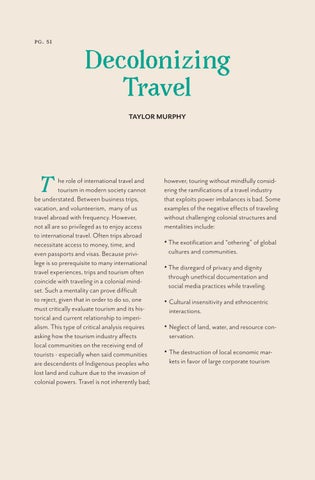pg. 51
Decolonizing Travel TAYLOR MURPHY
T
he role of international travel and tourism in modern society cannot be understated. Between business trips, vacation, and volunteerism, many of us travel abroad with frequency. However, not all are so privileged as to enjoy access to international travel. Often trips abroad necessitate access to money, time, and even passports and visas. Because privilege is so prerequisite to many international travel experiences, trips and tourism often coincide with traveling in a colonial mindset. Such a mentality can prove difficult to reject, given that in order to do so, one must critically evaluate tourism and its historical and current relationship to imperialism. This type of critical analysis requires asking how the tourism industry affects local communities on the receiving end of tourists - especially when said communities are descendents of Indigenous peoples who lost land and culture due to the invasion of colonial powers. Travel is not inherently bad;
however, touring without mindfully considering the ramifications of a travel industry that exploits power imbalances is bad. Some examples of the negative effects of traveling without challenging colonial structures and mentalities include: • The exotification and “othering” of global cultures and communities. • The disregard of privacy and dignity through unethical documentation and social media practices while traveling. •C ultural insensitivity and ethnocentric interactions. •N eglect of land, water, and resource conservation. •T he destruction of local economic markets in favor of large corporate tourism








